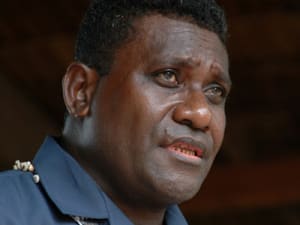
In November 2011, Solomon Islands finance minister Gordon Darcy Lilo was fired by then Prime Minister Danny Philip, who accused the former of undermining his government over public funds and foreign donations corruption activities — an issue that led to his resignation a few days after.
Almost a week after the row, the relieved cabinet official was appointed by parliament as new prime minister of the Pacific island nation with a wide margin of votes, even tagging Philips' corruption acts “unbelievable, unacceptable and sickening.”
But barely three years later, Lilo is facing the same issue — arguably, on a larger scale — as his predecessor.
These successive instances of widespread corruption in a country where development progress is slow and assistance is much needed has led several disgruntled local NGOs and civil society groups to ask donors to freeze aid and direct budget support to the Solomon Islands government — a move aid groups hope will serve as a wake-up call to Lilo and his people to stop embezzling money intended for the benefit of the people.
Aid freeze 'crucial' — NGOs
“[Corruption] has been a longstanding problem in the country but has become more pronounced recently under the current regime. Prime Minister Lilo announced in 2013 that his government supports a 'zero tolerance for corruption' policy but has failed to live up to this,” Barnabas Henson, interim chairman of the country’s Joint Civil Society Groups and Concerned Citizens, told Devex.
Henson added that the call to “impose a general aid freeze on direct budget support" will be crucial “unless Lilo gets his act together and places an immediate stop to members of his cabinet and government helping themselves to state financial resources.”
The corruption allegations are widespread. In September, eight public officials were sacked following the confirmation of a SB$10 million ($1.4 million) fraud in the country’s ministry of health and medical services transactions in a project related to the Health Sector Support Program funded by the now-defunct AusAID. The scheme included inflated prices of items as well as the contracting of unauthorized shipping middlemen.
In a separate petition calling for Lilo’s resignation from the prime minister’s office, JCSG/CC detailed the leader’s alleged corruption scandals and misappropriation of millions of dollars in public funds and foreign aid. It includes poor financial management of the country’s state scholarship, misappropriation of a $4.9 million computer project, overspending in overseas trips, deliberate negligence of prudent public spending, and failure to protect ethnic people’s rights and interests, among others.
Turning a ‘blind eye’
The Solomon Islands remain stunted in development progress compared to other Pacific island nations mainly due to poor governance.
According to the 2013 Human Development Index of the UN Development Program, the Pacific island nation ranks 143rd out of 187 countries surveyed. Although the country’s HDI value increased by 9 percent in the past decade, it remains at the lower half of the rankings, even behind neighbors Vanuatu and Kiribati.
This continued slump in development progress, as reiterated by Henson, is mainly due to corruption and other bad governance issues that is — to an extent — continually ignored by the international donor community. The country is not included in the latest Corruptions Perception Index compiled by Transparency International.
“[We are] of the opinion that the international community has continued to support the Lilo regime despite knowing the high level of corruption that is going on in government,” the NGO leader said. “It is rather sad and unfortunate that the international community has intentionally elected to turn a blind eye on official corruption on Solomon Islands.”
Henson cited the example of Uganda, where a controversial law discriminating against homosexuals prompted several bilateral donors to withhold assistance to the country in protest of the possible implications of the new policy — a bold call following his recent personal tirade with the government that branded him as a “loner” and asks for him to “exercise maturity and respect” due to the petition and statement against Lilo.
“Why can’t the same line of action be taken against the more serious issue of official corruption in the Solomon Islands?” he noted. “Non-action by the donor community in addressing the issue of official corruption was the reason for the ‘blind eye’ public perception.”
Foreign assistance plays a huge part in the country’s operations. Donor commitments to the Solomon Islands — including external budget support for health, education, finance, and judicial services — in 2013 amounted to $924.6 million, according to data from the country’s finance ministry.
More active role
To address this steep challenge, Henson urged the international development community to take a more active role in preventing and eradicating corruption in the governance system of the country and demand corruption control measures "as a prerequisite to any future bilateral partnership agreements with a joint monitoring and evaluation component to aid programs" in the Solomon Islands.
In late 2013, the Lilo government announced it would be mandating the creation of an independent commission against corruption with the bill projected to be ready early this year.
The commission will be “responsible for investigating and prosecuting cases of corruption and enhancing integrity in government institutions.”
Whether this plan pushes through — especially with the incumbent government embroiled in deep controversy regarding the very issue the planned commission is structured to deal with — is however still up in the air.
Read more development aid news online, and subscribe to The Development Newswire to receive top international development headlines from the world’s leading donors, news sources and opinion leaders — emailed to you FREE every business day.








